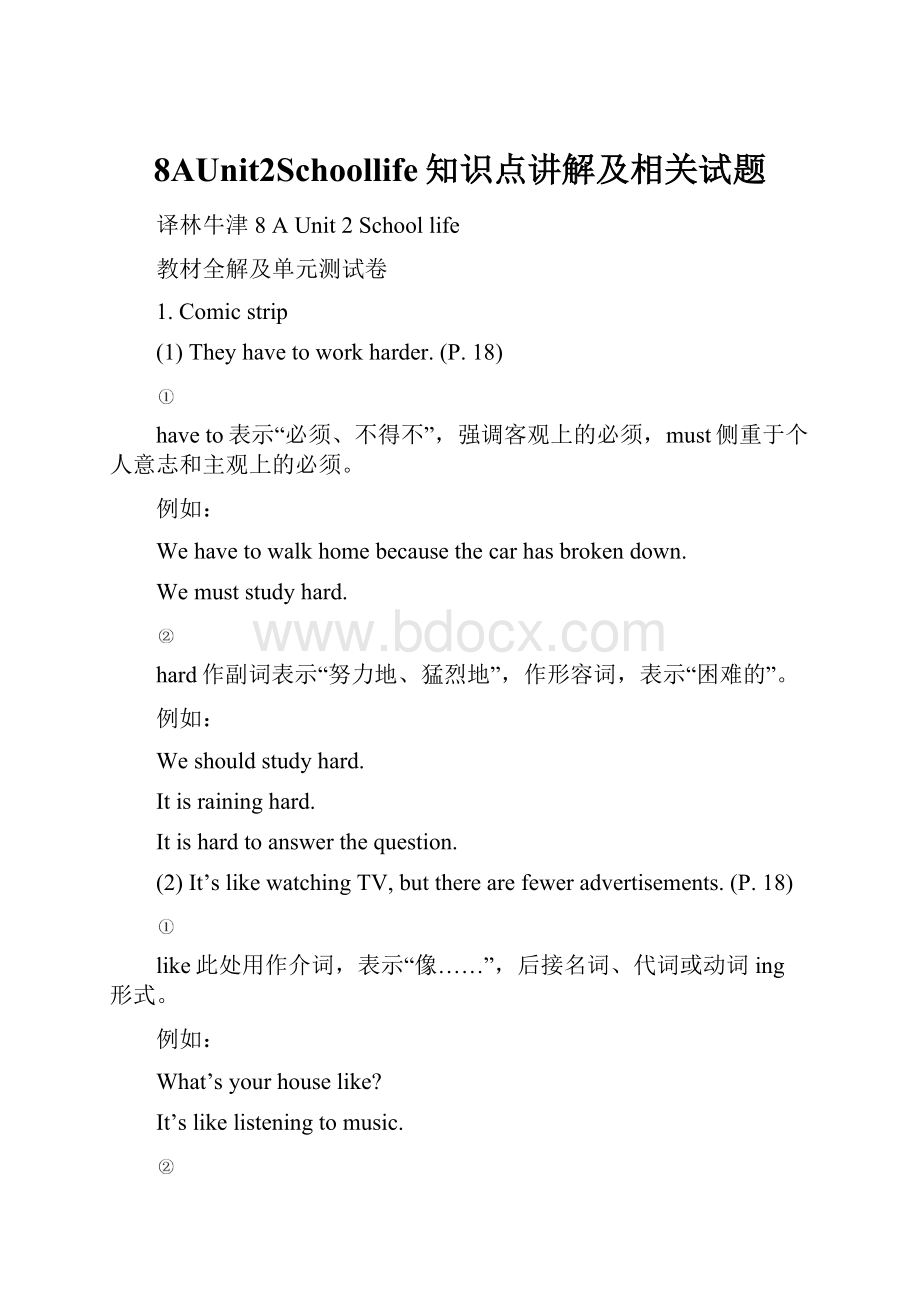8AUnit2Schoollife知识点讲解及相关试题.docx
《8AUnit2Schoollife知识点讲解及相关试题.docx》由会员分享,可在线阅读,更多相关《8AUnit2Schoollife知识点讲解及相关试题.docx(25页珍藏版)》请在冰豆网上搜索。

8AUnit2Schoollife知识点讲解及相关试题
译林牛津8AUnit2Schoollife
教材全解及单元测试卷
1.Comicstrip
(1)Theyhavetoworkharder.(P.18)
haveto表示“必须、不得不”,强调客观上的必须,must侧重于个人意志和主观上的必须。
例如:
Wehavetowalkhomebecausethecarhasbrokendown.
Wemuststudyhard.
hard作副词表示“努力地、猛烈地”,作形容词,表示“困难的”。
例如:
Weshouldstudyhard.
Itisraininghard.
Itishardtoanswerthequestion.
(2)It’slikewatchingTV,buttherearefeweradvertisements.(P.18)
like此处用作介词,表示“像……”,后接名词、代词或动词ing形式。
例如:
What’syourhouselike?
It’slikelisteningtomusic.
few意为“很少”,表示否定意义,修饰可数名词复数,afew表示“一些”,表示肯定意义,修饰可数名词复数。
例如:
Fewpeopleunderstandthisdifference.
IhaveafewfriendsinAmerica.
2.Welcometotheunit
(1)vacation(P.19)
vacation表示“假期”多用于美式英语中,而英式英语中用holiday。
beonvacation“在度假”,goonvacation“去度假”,takeavacation“度假”,thewinter/summervacation“寒/暑假”。
例如:
MrWangwasonvacationlastmonth.
TheyaregoingtoEnglandtospendtheirsummerholidays.
(2)I’dliketobuysomebiscuits.(P.19)
wouldlike意为“想要”,常用的结构有:
wouldlikesth.“想要某物”;wouldliketodosth.“想要做某事”。
例如:
Iwouldlikesomeapples.
Hewouldliketoeatsomebananas.
【拓展】
1.“Wouldyoulikesth.?
”句型的肯定回答用“Yes,please.”,否定回答用“No,thanks.”。
2.“Wouldyouliketodosth.?
”句型的肯定回答用“Yes,I’dlike/loveto.”,否定回答用“I’dlike/loveto,but...”。
(3)Shallwegotogether?
(P.19)
“Shallwe...?
”意为“我们……好吗?
”用于征求他人意见、向他人提出建议或者请求他人的许可,肯定回答用“Goodidea./That’sagoodidea./Ofcourse,I’dliketo.”,否定回答为“I’msorry,butI...”。
例如:
---Shallwegotothemuseum?
---That’sagoodidea.
(4)I’dliketo,buttheschoolfootballteamwillpractisethisSaturday.(P.19)
practise用作及物动词,意为“练习、操练”后接动名词作宾语。
Myyoungerbrotherpractisesplayingthepianoeveryday.
3.Reading
(1)Itisamixedschool.(P.20)
mixed这里作为形容词,意为“男女混合的”。
例如:
Alltheschoolsherearemixedones.
Ihadmixedfeelingsaboutmeetinghimagain.
【拓展】mix作动词,表示“混合、混在一起”,mixup意为“混合在一起”。
Let’smixtheflourwithwater.
Hemixedupalltheingredients.
(2)Amongallmysubjects,IlikeFrenchbest.(P.20)
like...best意为“最喜欢……”,可与含有favorite的句子互换。
Ilikesummerbest.
=Summerismyfavoriteseason.
(3)Learningforeignlanguagesisfun.(P.20)
动名词短语作主语时,谓语动词用单数形式。
例如:
Readinginthesunisbadforyoureyes.
Seeingisbelieving.
(4)Duringtheweek,wecanborrowmorebooksfromtheschoollibrary.(P.20)
borrow作及物动词,表示“借进来”,常用的结构为“borrowsth.fromsb.”“从某人拿借某物”,lend表示“借出去”,用于“lendsb.sth.=lendsth.tosb.”结构中。
例如:
Heborrowed1,000dollarsfromhisfriend.
Ilentmybiketohimyesterday.
=Ilenthimmybikeyesterday.
(5)Wecanalsobringinbooksandmagazinesfromhome.(P.20)
bringin表示“带来”。
LiuNanbroughtinsomebeautifulflowersfromhomeyesterday.
【拓展】bring相关短语
bringalong把……一起带来
bring...out出版、使呈现
bringup抚养长大
bring...tolife使……苏醒
(6)Neartheendoftheweek,wediscussthebookswithourclassmatesinclass.(P.20)
end作名词,表示“末端、尽头”,attheendof“在……尽头”,intheend“最后、终于”。
例如:
We’llhaveatestattheendofthismonth.
Heworkedouttheproblemintheend.
discuss作及物动词,表示“讨论”,discusssth.withsb.“和某人讨论某事”,名词为discussion。
例如:
Whydidn’tyoudiscussitwithyourteacher?
Hejoinedusinthediscussionyesterday.
(7)Timesseemstogofasterwhenwearereadinginterestingbooks.(P.20)
seem意为“仿佛、似乎”,常用于以下结构中
seem+形容词(seemtobe+形容词)意为“好像、似乎”。
Thatseemsveryeasy.
Thebookseems(tobe)quietinteresting.
seemtodosth.意为“好像做某事、似乎做某事”。
Thebabyseemstobeasleep.
Itseemstorain.
Itseemsthat...“好像……、似乎……”。
Itseemsthatnooneknowswhathappened.
Itseemsthatyouareright.
(8)Heoftenlistenscarefullytomyproblemsandoffersmehelp.(P.20)
offer/用作及物动词,意为“主动提出、自愿给予”,主要用法如下:
offersth.意为“提供某物、提供某事”。
Heofferedagoodplanforourholiday.
offertodosth.意为“(主动)提出做某事”。
Tomofferedtodriveustothebusstation.
offersb.sth./offersth.tosb.意为“(主动)给某人提供某物”。
Weshouldofferothersourhelp.
(9)OnFridayafternoon,ourschoolendsearlierthanusual.(P.20)
介词on用来表示具体某一天或某一天的上午、下午、晚上。
onMondayevening
ontheafternoonofMay1st
onacoldmorning
end用作动词,表示“结束”,相当于beover。
Whattimedoesyourschoolend?
usual意为“平常的、通常的”,asusual表示“像往常一样”。
It’susualforhimtogotoschoolonfoot.
Asusual,hegottoschoolat7o’clock.
(10)Ourteamwontwogameslastmonth.(P.20)
win此处用作及物动词,意为“赢得”,也可以作不及物动词,表示“获胜,赢”。
例如:
Whowonthemen’s400-metrerace?
Wemustwintoday.
【拓展】辨析win和beat/defeat
win所接的宾语一般表示比赛、战斗、辩论、奖金等名词;beat/defeat所接的宾语是参加比赛的人或者团队,意为“战胜、打败(某人)”。
LiLeibeatTomandwonthefirstprize.
(11)BothNancyandJohnareGrade8students.(P.22)
both...and...表示“……和……都、既……又……”,在句中连接两个并列关系的词。
例如:
Tomcanbothsinganddance.
BothJimandhiseldersisteraregoodatEnglish.
(12)IreadanarticlebyaboyfromtheUSA.(P.22)
by此处作介词,表示“由……、被……”。
例如:
ThisisabookbyYangHongying.
---Whowasthemusicby?
---ItwasbyMozart.
4.Grammar
(1)further(P.24)
further是far的比较级,far的比较级有两种形式,即farther和further,farther表示具体的距离上“更远、较远”;further除了表示距离上“更远”以外,还可以表示抽象意义上“更进一步”。
例如:
Hewalksalittlefurther.
Jimcanjumpfartherthanhisbrother.
Manystudentssendtheirchildrentoforeigncountriesforfurtherstudy.
(2)Shedrawsbetterthananyotherstudentinmyclass.(P.24)
“比较级+thananyother+单数名词”意为“比其它任何一个都……”,该结构形式上是比较级,实际表达最高级含义,该结构中的名词必须用单数形式。
Tomswimsfasterthananyotherboyofthethree.
=Tomswimsfastestofthethreeboys.
5.Integratedskills
(1)Howmuchtimedostudentsspendonhomeworkeveryday?
(P.25)
spend表示“花费”,常用的结构有:
spend+时间/金钱+onsth.或者spend+时间/金钱+(in)doingsth.。
例如:
Lilyspenttwentydollarsonthenewdress.
Lilyspendstwohoursfinishingherhomework.
【拓展】辨析spend,pay,take和cost
spend
主语是人
spend...onsth./spend...(in)doingsth.
pay
主语是人
payforsth./paysb.forsth.
take
主语是it
Ittakessb.+时间+todosth.
cost
主语是物
sth.costssb.+金钱
(2)Dostudentswearuniforms?
(P.25)
wear作及物动词,表示“穿着、戴着”。
Healwayswearsawhiteshirt.
【拓展】辨析wear,puton和dress
wear
穿着
侧重于穿戴的状态
Thegirlwearsaredcoattoday.
puton
穿上
侧重于穿戴的动作
Putonyourcoat.Itiscoldoutside.
dress
给……穿衣服
指给自己或者他人穿衣服
Theboyistooyoungtodresshimself.
(3)ChinesestudentshavemoreweeksoffforthesummerholidaythanBritishstudents.(P.25)
“have+一段时间+off”意为“休息多长时间、放假多长时间”。
Theywillhavethreeweeksoffforthewinterholiday.
6.Studyskills
(1)daily(P.27)
daily作形容词,表示“每日的、日常的”,相当于everyday。
Therewaslittlechangeintheirdailylife.
(2)Ilookedthroughthequestionquickly.(P.27)
lookthrough意为“浏览、快速查看、透过……看”。
例如:
Beforeyouanswerthesequestions,you’dbetterlookthroughthemfirst.
Lookthroughthewindow,andyoucanseethebeautifulview.
(3)Ireadveryslowlyatfirst,butIamdoingbetternow.(P.27)
atfirst意为“首先、起初”,相当于firstofall,反义词为atlast或者intheend。
Atfirstweusedhandtools.Laterwehadmachines.
(4)IalsokeepwritinginEnglishaboutmydailylife.(P.27)
keep(on)doingsth.意为“继续做某事、重复做某事”。
Theykepttalkingaboutit.
7.Task
(1)Howlongislunchtimeatyourschool?
(P.28)
howlong此处表示“多长时间”,对时间段进行提问,另外,还可以表示“物体的长度”,对长度进行提问。
例如:
---Howlongwereyouawayfromschoollastyear?
---Aboutthreeyears.
---Howlongistheriver?
---About15kilometers.
【拓展】辨析howlong,howsoon和howoften
howlong
“多长时间”,提问for和since引出的时间状语
---Howlongdidyoustaythere?
---Forabouttwoweeks.
howsoon
“多久”提问“in+一段时间”
---Howsoonwilltheycomeback?
---Intwoweeks.
howoften
“多久一次”,提问动作发生的频率
---Howoftendoyougohome?
---Onceaweek.
(2)Doyouthinkyourschoolisagoodone?
(P.28)
one用作不定代词,指代前面提到过的那类事物中的一个,复数为ones。
one指同一类事物,it指同一个事物。
例如:
Ihaveanewhatandseveraloldones.
Thecoatishers.It’sverybeautiful.
(3)Ilovecomputers,soIhavecomputerlessonseveryday.(P.29)
so作连词,意为“因此、所以”,表示结果,不可以和because同时连用。
Lilyisverykind,soeverylikesher.
(4)Wealwayshavefun.(P.29)
havefun意为“玩得开心”,相当于haveagoodtime,后接名词时加上介词with,即havefunwithsth.;接动词时,用动词的ing形式,即havefundoingsth.。
例如:
Didyouhavefunlastweekend?
Thechildrenhavealotoffunwiththebuildingblocks.
Wehadfunplayinginthepark.
【重点短语和句型归纳】
1、重点短语
1.haveto必须,不得不
2.learnabout了解
3.buysth.forsb.为某人买某物
4.duringtheweek在这周期间
5.borrow…from…从…借…
6.discuss…with…与…谈论…
7.intheclub在俱乐部里
8.helpsb.dosth.帮助某人做某事
9.offersb.sth.给予某人某物
10.twiceaweek一周两次
11.domorningexercises做早操
12.playcheese下象棋
13.atmost至多,不超过
14.lookthrough浏览
15.atfirst起初,至先
16.keep(on)doingsth.继续,重复做某事
17.gotoschool/seeafilm去学校/看电影
18.watchTV看电视
19.can’twait迫不及待
20.amixedschool一所混合学校
21.havelessonstogether一起上课
22.bringin带来
23.seemtodo似乎将要做某事
24.more…than…比…多…
25.intherace在比赛中
26.dosomereading做一些阅读
27.goonaschooltrip参加学校旅行
2、重点句型
1.What+be+主语+like?
……怎么样?
2.Shallwedosth.?
我们做某事好吗?
3.seemtodosth.仿佛/似乎做某事
4.比较级+than+anyother+单数名词比其它任何一个都……
5.spendtimeon/doingsth.花费时间做某事
6.Whydon’tyoudosth.?
你为什么不做某事?
7.finishdoingsth.完成做某事
8.practisedoingsth.练习做某事
【语法讲解】
1.如何比较数量的多少
①两者之间数量上的比较
(1)用”more…than…”结构表示“……比……多”,more后接可数名词复数或不可数名词。
(2)用“fewer/less…than…”结构表示“……比……少”,fewer后接可数名词复数,less后接不可数名词。
②三者或三者以上的数量上的比较
(1)用themost表示“最多”,most后接可数名词复数或不可数名词。
(2)用thefewest/least表示“最少”,fewest后接可数名词复数,least后接不可数名词。
Ihavethefewestbooksinourclass.在我们班里我有最少的书。
2.副词的比较级和最高级
①副词比较级和最高级的构成
(1)规则变化:
单音节词副词,加-(e)r
a、副词和形容词同形,单音节,在词尾加-er,fast-faster,hard-harder,loud-louder
b、以字母e结尾的副词,加-r,late-later
c、以辅音字母+y结尾的副词,先变y为i,再加-er,early-earlier
部分双音节副词和多音节副词,前面加more,carefully-morecarefully,politely-morepolitely
【注意】同理,最高级也一样,只是将-er换成-est,more换成most而已。
(2)不规则变化:
well-better-best
badly-worse-worst
far-farther-farthest
②副词比较级的用法
A+…副词的比较级+thanB.
当than前后使用的动词相同时,通常用do的某种形式代替后面的动词,该词可以省略。
③副词最高级常用句型结